Happy New Year – it’s the anniversary of when, courtesy of the EU’s Free Movement of Peoples directive, restrictions were lifted on the numbers of Romanians and Bulgarians entering the UK.
Latest figures released by the Oxford Migration Observatory show that 250,000 are now here and 47,000 arrived during 2014. That’s equivalent to a city the size of Wolverhampton – and 20% are jobless.
The inflow of around 50,000 a year, it should be noted, is exactly in line with what Migration Watch predicted in January 2013, and as Sir Andrew (Lord) Green pointed out, are likely to cause huge additional pressures in terms of the ability of our infrastructure and services to cope.
The playing down by the BBC of the likely scale of the inflow from the two countries began in earnest in April of 2013, when Newsnight told us that its own survey showed that Romanians weren’t really interested in coming here.
By commissioning such a poll (not cheap, but, hey ho, it’s only licence fee money) , the programme fired a clear shot showing the extent editors would go to spike the guns of those who wanted to raise immigration issues.
Then last January, as the restrictions were lifted, programmes continued the effort to tell us that there would be no repetition of the Polish surge of EU immigrants back in 2004. A good example is this, filed at the end of January 2014. The reporter tells us he could find only one Romanian family in Peterborough. His approach clearly reflected the corporate editorial angle: nothing to see.
But it was on May 14 – just over a week away from the poll in the European election on May 22 – when the BBC editors demonstrated the full weight of their desire to discredit those with concerns about immigration. Provisional government figures showed a minor blip in the upward trend in entries from Bulgaria and Romania. Such interim totals should always be treated with caution. Not at the BBC. Political editor Nick Robinson went to town, as this transcript shows.
For him, and the BBC news machine, it seems this was exactly the ammunition for which they had perhaps been praying.
In the BBC1 6pm and 10pm News that day – in a feature bristling with righteous indignation – Robinson first spoke to a Romanian who told him that all his fellow countrymen who wanted to come to the UK were already here.
Then he inserted a soundbite from Nigel Farage deliberately edited, it seemed, to make him look both immoderate and foolish in his predictions. And finally, just for good measure, he lined up Yvette Cooper , Vince Cable and Conservative employment minister Ester McVey all to say what total tommyrot he – and those with fears about immigration – were talking.
Yvette Cooper kicked off, laying into Farage’s ‘shrill claims’; Cable referred to ‘scare-mongering’ and Ms McVey said that the latest figures showed Mr Farage was ‘wrong’.
This was a pivotal movement in the election coverage, as the News-watch report covering the campaign, pointed out. It epitomised the Corporation’s main editorial approach – to seek to undermine wherever possible the case for withdrawal from the EU and the restriction of immigration.
Of course, UKIP surged to first place in the European poll and have since won two by-election victories. Many at the BBC argue, therefore, that this shows that their coverage towards those who have concerns about the EU and immigration is fair.
But this is utter nonsense. Close scrutiny of transcripts over long periods shows that their bias both by deliberate skewing and ignoring key reports and evidence. The electoral victories are being achieved despite constant editorial obstruction. And maybe also – to an extent – because people see through the bias?
What the new Romanian and Bulgarian figures also show is just how much the BBC is prepared to distort or ignore the actual evidence.
The Oxford Observatory report containing the latest figures was released on an embargoed basis to the media on December 29 at the latest and posted on its website on December 30. The report was mentioned widely and prominently in the national press that morning. But on the BBC website? Not a peep. On the Today programme? Zip.
Instead, on Today, we got guest editor Lenny Henry doing his level best – in every way he knew – to accuse UKIP MEP Amjad Bashir of being racist and a traitor to ethnic minorities for daring to want a points system for immigration. Yes, the admirable and good humoured Bashir gave us good as he got – but there was no disguising Henry’s vehement distaste.


